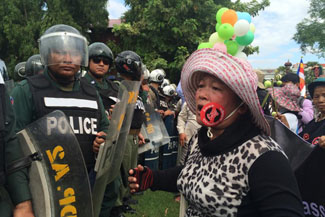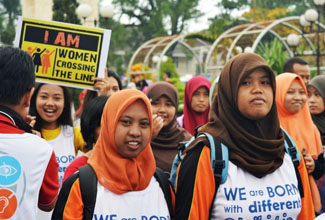In 2015, women activists in Southeast Asia were on the frontlines of crises and change. Despite experiencing some setbacks, women activists united and took collective action on critical issues affecting them such as repressive laws and backlash. The following stories highlight the different ways that Southeast Asian women rose above some of 2015’s most challenging moments:
1. Indonesia’s haze crisis and women-led responses. Forest fires are a yearly occurrence but 2015 saw the worst fires by far – with the haze reaching Singapore, Malaysia and other nearby countries. Despite limited resources Indonesian women continue to lead actions to mitigate the grave effects of the forest fires in the most affected communities. Members of the youth organization co-created with JASS, FAMM-Indonesia (Young Indonesian Women Activists’ Forum) from Kalimantan and Sumatera work through their organizations and networks to provide much-needed health care and monitor the impact of the haze on individuals and communities. In West Kalimantan, FAMM-Indonesia members working in Yayasan Palung are raising awareness through Sekolah Lahan Gambut (Peatlands School) about peatlands (organic wetlands) as a source of livelihood not just as a product of a plantation.
2. Cambodian women stood up against a repressive NGO law. The passage of the law on associations and non-government organizations (also known as LANGO) was one of the major pushbacks on democratic freedoms in Cambodia. Mandatory registration for all organizations is one of the primary provisions of the law. Failure to register with the government and report activities and finances results in payment of fines, criminal prosecution or shutdowns. JASS Southeast Asia (JASS SEA) and JASS-inspired youth alliance CYWEN (Cambodian Young Women’s Empowerment Network) joined protests that called for inclusion of civil society organizations in the discussions regarding the draft law (through consultations) and the eventual call for the scrapping of the enacted law.
Without hearing the side of civil society organizations, including women’s organizations, on the 13th of July 2015, the law was enacted by the Cambodian Parliament. The law was also passed without the presence of the opposition lawmakers from the CNRP (Cambodia National Rescue Party) who walked out during the session.
3. Women of Myanmar led emergency and relief efforts during the flooding. Deemed the worst flooding to hit Myanmar in decades, heavy rains coupled with cyclone Komen affected around 1.6 million people, displaced and killed hundreds. Various organizations in Chin State led by Women’s Hand Myanmar Foundation (WHMF) initiated emergency relief efforts that targeted the most remote areas not reached by local and international donor agencies, and even by the Myanmar government. Landslides blocked roads which made delivering relief goods a challenge. Heavy rains continued until November and the relief and rehabilitation of Myanmar continues up to this day.
Experience has taught us that solidarity is a critical relief strategy in times of crisis. In support of WHMF’s fundraising initiative for the affected communities of Chin, we created a Donate page for Chin State on our JASS website.
4. #SaveMaryJane campaign and Mary Jane Veloso’s temporary stay of execution. Women’s rights groups in Southeast Asia stood with the rest of the world in calling for a reprieve for Filipina human trafficking victim Mary Jane Veloso. Veloso’s case brought the plight of migrant women into the spotlight – particularly women victims of human trafficking. The #SaveMaryJane campaign highlighted the power of movements as grassroots groups led by migrant rights organizations and including women’s groups spearheaded the campaign to free Veloso, who is a victim of international human trafficking and drug syndicates.
Veloso was scheduled to be executed on the 29th of April 2015 on account of drug charges filed against her. On the fateful early morning of the 29th, the Indonesian government granted her a stay of execution while eight other convicts had their death sentence carried out. The campaign to #SaveMaryJane continues as Veloso is still on death row, pending the outcome of investigation and criminal cases filed against Philippine-based members of the human trafficking syndicates.
5. Indonesian women fight fundamentalism on IDAHOT commemoration. On May 17, groups led by LGBTQI (lesbian-gay-bisexual-trans-queer-intersex) in Malang, Indonesia planned to commemorate the International Day against Homophobia and Transphobia (IDAHOT). Days prior to the event, volunteers from Kojigema Institute and FAMM-Indonesia, the main organizers of the IDAHOT in Malang, received calls from men who said they were “investigating” the activity, but were actually using threats and intimidation to force them to cancel the activity. Kojigema and FAMM-Indonesia eventually cancelled the event to ensure the safety of participants. Instead, they instead held a press conference spotlighting the harassment of the LGBTQI community.
6. Southeast Asian women activists released from jail. Rights groups scored victory when women  political prisoners in Cambodia and the Philippines were released in 2015. JASS Southeast joined in the campaigns for their release during the JASS 4th annual regional campaign One Day, One Voice (ODOV) in 2014. Kong Chantha and nine other Cambodian land rights activists, mostly from the Boeung Kak community, were given the royal pardon and were freed on the 11th of April 2015. The Boeung Kak women activists were arrested in November 2014 while holding a protest to demand the city government address the flooding problem in their community. They were charged and convicted for obstructing traffic.
political prisoners in Cambodia and the Philippines were released in 2015. JASS Southeast joined in the campaigns for their release during the JASS 4th annual regional campaign One Day, One Voice (ODOV) in 2014. Kong Chantha and nine other Cambodian land rights activists, mostly from the Boeung Kak community, were given the royal pardon and were freed on the 11th of April 2015. The Boeung Kak women activists were arrested in November 2014 while holding a protest to demand the city government address the flooding problem in their community. They were charged and convicted for obstructing traffic.
In a similar vein, trumped-up criminal charges against Filipina peasant rights activist Andrea Rosal were dismissed and she was freed on the 7th of September 2015. Andrea was arrested while pregnant and gave birth in prison. Unfortunately, her baby died two days after she gave birth. Many Filipino women political prisoners remain imprisoned on fabricated charges and there are continuing initiatives and campaigns to free the remaining jailed women political prisoners.
7. Thousands of Southeast Asian women marked the 16 Days of Activism against Gender-Based Violence campaign. In solidarity with women all over the world, Southeast Asian women marked the 16 Days of Activism through the annual regional campaign One Day, One Voice (ODOV). Women activists mobilized thousands in dialogues, demonstrations, marches, and cultural performances and action across the region. 2015’s call “Our Rights, Our Resources, Our Life”, spotlighted the courageous ways women are defending their rights on resources—e.g. land, water, food) and social services like education—against governments, private firms and corporate interests.
Amid the shrinking democratic spaces and pushbacks in women’s rights in Southeast Asia, women’s collective spirit remains strong and unwavering. In 2016, stay tuned for more stories of women’s organizing and resilience across the region.
Article written by Osang Langara
Photo Credit: FAMM-Indonesia, CYWEN


























